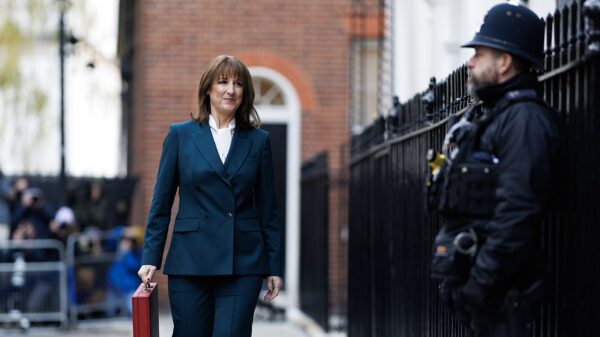Staff Writer Penelope Spencer-Simpson examines Angela Rayner’s political journey and resignation.
On 5 September 2025, after a decade of political ascendance, Angela Rayner announced her resignation as Deputy Prime Minister, Deputy Leader and Housing Minister. Unique amongst her privately educated, Etonian and Oxbridge political peers, Rayner’s journey into politics defied the norm. Yet, her experiences as a working-class, Northern woman defined her political career.
Born and raised on a council-estate in Stockport, Rayner left her comprehensive school at 16. Pregnant and with no qualifications, she left her school told she would “never amount to anything“. However, shortly after, Rayner enrolled at her local FE college where she learnt British Sign Language and took a vocational course in social care. She then became a care worker for Stockport Council. Given her gutsy approach, it is no surprise that she was nominated as a union representative at UNISON by her female peers. By 2015, Rayner was elected as MP for Ashton-under-Lyne—the first female MP in the constituency’s 180 year-old history.
Her personal experiences of and within public services resonated with constituents all over the country. Valued as a ‘working-class hero’—someone who catapulted to the top, but never forgot her socioeconomic and cultural roots. This ‘working-class girl done good’ concept frames her political image. Even when her image appears to be irreparably damaged: the political scandal began when the Conservatives lodged a request over whether the Deputy PM broke the ministerial code following the flat row over the £800,000 home in Hove, East Sussex.
Rayner’s background itself became food for controversy as multiple cross-party news outlets and sources commented on Rayner’s situation as a mere reflection of her upbringing, dismissing her ‘working-class hero’ trademark as a myth, spinning a caricature. An attempt to confine her abilities, and overlook her triumphant rise to the peaks of politics. Perhaps without this Northern, working-class voice at the front of Government, Parliament will capsize in the currents of British politics.
Rayner takes “full responsibility for this error“—an incorrect rate for stamp duty land tax (SDLT) which reportedly saved her £40,000 in stamp duty—and intends to settle the balance. The ex-Minister “deeply regrets” her mistake in not seeking further tax advice for her arrangements, given her political role and the complexity of her familial circumstances. Sir Laurie Magnus, the Independent Adviser on Ministerial Standards to whom Rayner self-referred, confirmed she had “provided her full and open cooperation” for his inquiries. Both Sir Magnus and Rayner confirmed that there was no lucrative intent behind the tax row. Rather, it was unintentional.
In the wake of her divorce from Mark Rayner in 2023, both parents committed to transfer their interest from their Ashton-under-Lyne home to a trust set up for their son, Charlie. Created following ‘financial’ compensation the family received in 2020, the trust helps aid their disabled son, who was born prematurely. Rayner’s personal statement about the row, reflects on how she wanted to ensure Charlie could “continue to live in the home he feels safe in“.
Rayner’s parental instinct should not be weaponised as a moment of weakness by the opposition. As Rayner stated, “Every decision [she has] made has been guided by what [she believes] to be in [her] children’s best interests.” The unwritten consensus among parents is that their children come first—politicians are not exempt from this.
Acting in this context, Rayner sold her 25% interest on the house to her son’s trust in January 2025, in order to lay down a deposit for her current home in Hove. Tax advice she received led the ex-Minister to believe the lower rate of SDLT (£30,000) was required since she no longer owned the Ashton property. However, Sir Magnus concluded that Rayner should have payed the higher payment of SDLT as “a person who does not own a property can nonetheless be deemed to hold an interest in it if […] that property is held by a trust, and the beneficiary of the trust is a child of that person under the age of 18.”.
Yet, tax affairs are intrinsically depicted differently among politicians based on their background. Reform Leader Nigel Farage admitted on Sky News that he pays less tax on his earnings by funnelling earnings into a private company. Unlike the cacophonous attacks and calls of clarity from the Right in Rayner’s case, Farage’s flagrant admittance evaded widespread comment or critique, and has had no consequence for his political career. The contrasting responses to both Rayner and Farage typify a wider cultural divide within not only Westminster, but national politics.
Personal scrutiny and political alienation isn’t foreign to Rayner’s career. It has routinely been used as a political tool in attempt to delegitimise her presence. In 2022, Rayner called out the “sexism and misogyny” displayed by a myriad of newspapers which reported she crossed and uncrossed her legs during Prime Minister’s Questions to distract Boris Johnson. In 2025, she was criticised for having a glass of rosé in a Dryrobe on the beach front, with critics claiming she was neglecting her ‘woman of the people’ persona.
Her experiences as a woman, and especially as a working-class woman, are at the heart of both her political motivation and the political prejudice against her. Standing tall amidst the backlash, Angela Rayner remains “deeply proud” of her legacy. In her letter of resignation to the Prime Minister, Rayner recalled how much politics changed her life and gave her the opportunity to pay it forward by “serv[ing] working class communities like the one that [she] grew up in, which are too often overlooked by those in power.“.
Rayner’s rise to the top of politics gave hope for meritocracy in the face of prejudice. Ultimately, we have seen from the ex-Deputy Leader’s experiences that our backgrounds define our careers, characters, and flaws. Whilst it remains unclear how she will make her political comeback, Rayner’s trailblazing journey to and through politics is already inspiring and will prove a lasting legacy.
For more analysis of UK Politics click here.


















